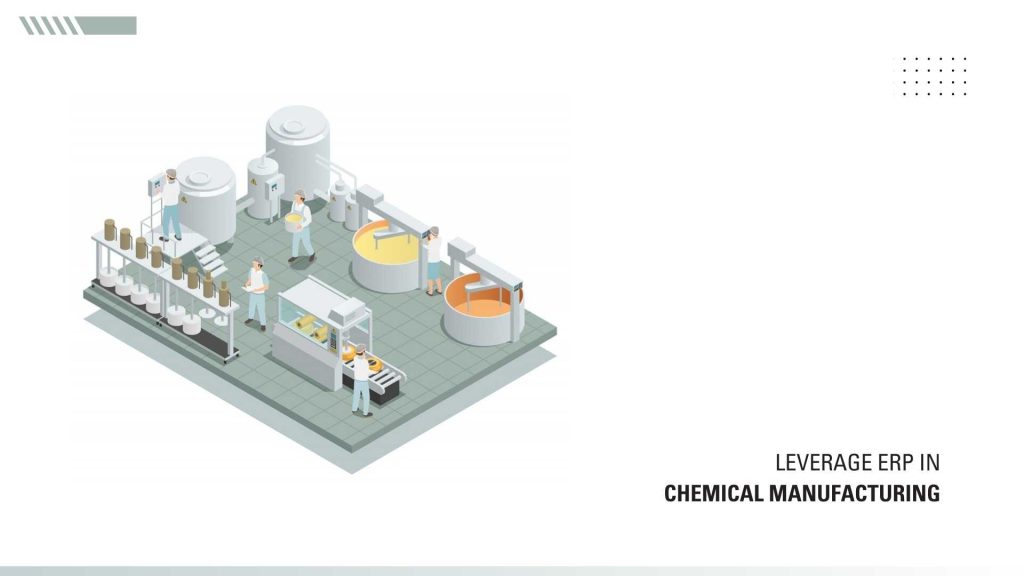Precision, compliance, and innovation are crucial cornerstones for sustained growth and competitive advantage in chemical manufacturing. Amidst these demands, ERP emerges as a potent solution, offering multifaceted benefits that redefine the operations landscape. Let’s explore Challenges in the chemical manufacturing business and how ERP systems revolutionize across key domains.
Most Common Challenges in Chemical Manufacturing
Certainly, chemical manufacturing is a complex industry with several inherent challenges that companies often encounter. Here are four significant challenges:
Regulatory Compliance and Safety Standards
Due to security concerns and environmental effects, the chemical manufacturing sector operates within a highly regulated environment. Navigating through many local, national, and international regulations demands meticulous adherence to safety standards, waste disposal protocols, and stringent compliance with environmental laws. Keeping up with evolving regulations while ensuring operational efficiency poses a significant challenge for companies.
Raw Material Sourcing and Supply Chain Disruptions
Chemical manufacturing heavily relies on raw materials sourced from various suppliers globally. Any disturbances in the supply chain, whether due to geopolitical uncertainties, natural disasters, or unforeseen circumstances, can severely impact production schedules, leading to shortages and increased costs. Maintaining a stable and diversified supply chain while mitigating risks associated with raw material scarcity or price fluctuations remains an ongoing challenge.
Technological Innovation and Industry 4.0 Integration
The industry is witnessing a shift toward digitalization and Industry 4.0 technologies. Adopting and integrating these innovations, such as IoT devices, predictive analytics, automation, and AI-driven solutions, presents a challenge. These technological advancements require significant investments, organizational readiness, and workforce upskilling. The challenge lies in leveraging these technologies effectively to enhance operational efficiency, improve quality control, and drive innovation.
Sustainability and Environmental Responsibility
Chemical manufacturing processes often generate waste and emissions that can have a detrimental impact on the environment. Balancing business objectives with sustainability goals necessitates reducing waste, minimizing carbon footprint, and implementing eco-friendly practices. Developing sustainable processes, investing in cleaner technologies, and meeting consumer demands for environmentally responsible products present a formidable challenge for the industry.
Leverage Manufacturing With ERP system
Formulation Management: Enhanced Precision and Compliance
Central to chemical manufacturing, formulation management necessitates meticulous precision and compliance adherence. ERP systems streamline this process by consolidating data, facilitating precise formulation control, and ensuring adherence to regulatory standards. With comprehensive tracking of raw materials, batch processes, and quality controls, ERP minimizes errors, optimizes formulations, and accelerates time-to-market for new products.
Stock Control: Optimal Inventory Management
Effective stock control is imperative in chemical manufacturing to maintain operational efficiency and minimize overhead costs. ERP solutions offer real-time visibility into inventory levels, demand forecasting, and automated replenishment, mitigating stock shortages or overages. It enables companies to optimize stock levels, reduce carrying costs, and meet customer demands promptly, fostering a competitive edge in the market.
Product Innovation: Accelerating Research and Development
Innovation lies at the heart of chemical manufacturing. ERP systems facilitate seamless collaboration between R&D teams, providing a unified platform for idea exchange, data analysis, and project tracking. By streamlining workflows and consolidating information, ERP expedites the innovation lifecycle, empowering companies to introduce novel products more swiftly while maintaining stringent quality standards.
Improved Collaboration: Breaking Silos, Fostering Synergy
Chemical manufacturing often involves cross-functional teams operating in silos, hindering communication and efficiency. ERP platforms serve as a centralized hub, enabling seamless collaboration among departments—production, sales, procurement, and finance. By fostering real-time data sharing and communication, ERP dismantles silos, fostering synergy and enabling informed decision-making across the organization.
More Efficient Supply Chain: Streamlined Operations
A robust supply chain is pivotal for chemical manufacturers. ERP systems optimize supply chain operations by integrating processes—from procurement and manufacturing to distribution and logistics. Through enhanced visibility, predictive analytics, and automated workflows, ERP ensures a more efficient supply chain, reducing lead times, minimizing disruptions, and optimizing resource allocation.
Conclusion
Acumatica ERP is a transformative solution poised to elevate chemical manufacturing businesses by addressing their specific industry needs. With its robust formulation management, inventory control, seamless collaboration, and supply chain optimization capabilities, Acumatica empowers companies to navigate regulatory complexities, innovate swiftly, and ensure operational excellence. Its scalable, cloud-based platform provides the agility and customization necessary to streamline processes, foster innovation, and drive sustainable shift in the dynamic landscape of chemical manufacturing.

Sangeetha brings 20 years of experience in Information Technology which includes Solution architecting, building micro services, research, and evaluation of business applications, integrating apps.

